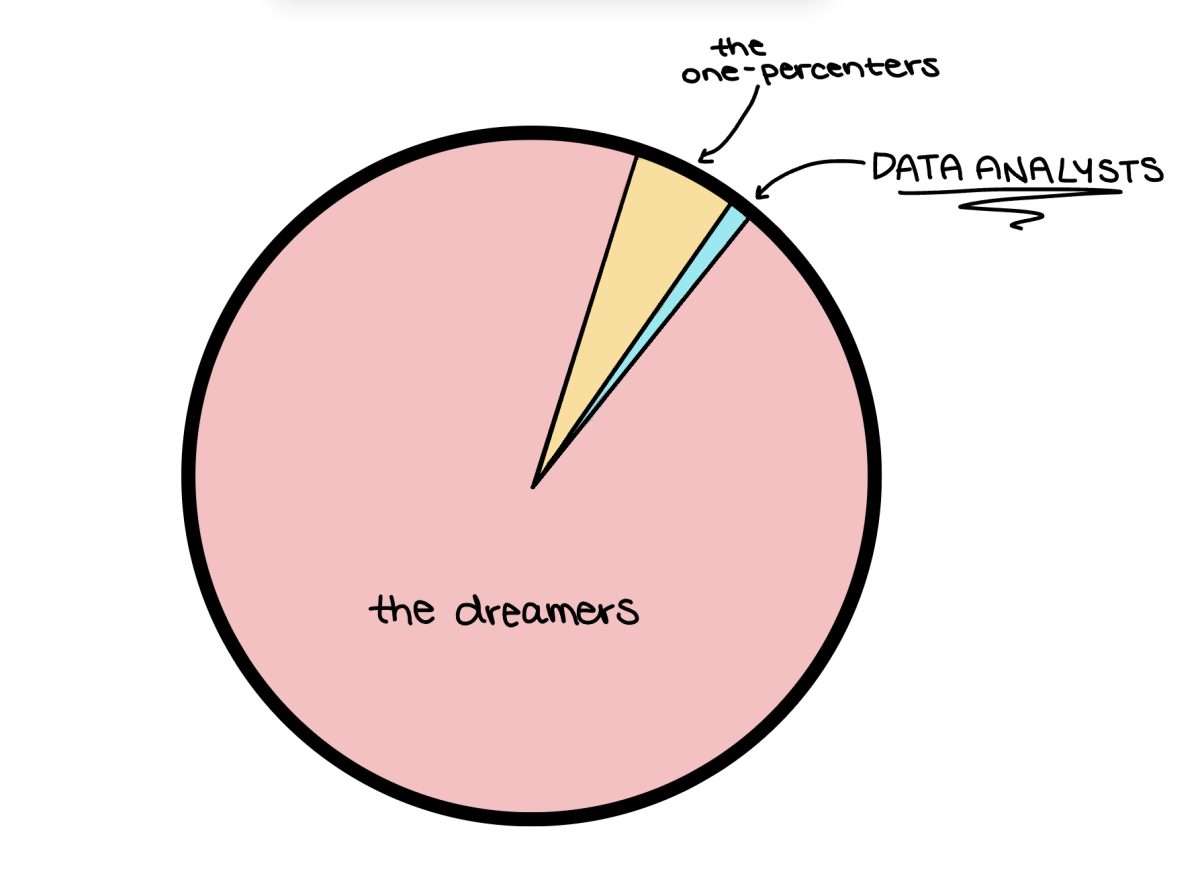One of my coworkers likes to tease me for having plans to go to college and start a career. He’ll chide me when I mention school, saying, “we don’t do aspirations around here. The sooner you give up on your dreams and accept that you’re gonna work here for the rest of your life, the better.”
“The only thing that you get to be when you grow up that you wanted to be when you were younger is taller,” said Summit senior Adele Hattrup. “At least most of us.”
I’ve grown up in a culture that expects you to achieve greatness as you enter adulthood. And no, this ‘greatness’ is not subjective. Attend a prestigious university, get a high paying job, live in the suburbs with your wife and two kids… sit on the throne of your wealth and look down at all the people who aren’t as successful as you are (with pity).
But after reflecting on the jobs of all the adults I know, it doesn’t seem as simple as people make it out to be.
Suddenly, a fashion career becomes a job at Macy’s. The dream of being an author has somehow devolved into writing food reviews for a two star Mexican restaurant. People went to law school but now they spend their days settling parking ticket disputes. People wanted to build robots and now they build iMacs… you get the point.
Maybe my coworker is right. In adulthood, it’s common for your dreams to shrivel up and die. In my Sociology class, we recently watched a bleak documentary called “The Line,” and pretty much any hope left in me that I could get out there and create change in the world dissipated. After entering the real world, everyone quickly realizes that pursuing success and wealth in this country sets you up for failure. Getting a job to help other people sucks the life out of you, earning wads of money destroys your world view, and not getting a stable job lands you under the poverty line (which, by the way, could happen no matter what you do, because very few jobs are reliable in the long term).
So after this realization, you find yourself jobless, dreamless, passionless, and, most prominently, dead inside. When jobsurfing on Indeed, you stumble across some sort of analytics position that requires zero past experience. Immediately, you apply.
Congratulations! You’ve just been hired as a low-level data analyst and today is your first day on the job. You didn’t get a wink of sleep last night in anticipation for the big day. You choose to wear beige business attire, because that’s just who you are now. You drink black coffee, because it keeps you calm (creamer tends to get you too amped up). Every day at the office is the same, but you find routine to be exhilarating.
SALARY
You eagerly shake hands with your boss on the way into the office. Their palm is clammy, and yours is too. They let you know your starting salary and take you to your desk, which is perfectly adequate. Fortunately, mahogany makes you feel important and the cramped space almost seems cozy.
By the way, you make bank. According to GlassDoor, the average pay for a data analyst is a whopping $62,664 per year in the United States (which is above the average salary in America by a healthy $3,000). This salary allows you to be fairly comfortable while also pushing you to work harder, since you’ll still need dual household income to live in any Bend neighborhood! And after your inevitable promotion, it’s only up from there. Emmy award winning editor Corey Ginsberg explains on Noble Desktop that there’s no time like the present to begin your data analytics career.
“The Global Big Data Analytics Market is expected to be worth $105 billion by 2027, which reflects a more than 12% growth from 2019 to 2027. Now is a better time than ever to enter the field of data analytics.”
SCHEDULE
Since your desk is satisfactory, you test out your mediocrely comfortable office chair. It’s perfect for you, since the chair isn’t necessarily intolerable, but there’s also no way you’ll ever be able to doze off behind your computer. You begin to plan out your weekly schedule as fellow employees trickle in, all of whom have a bright smile but not a single speck of light in their eyes.
Ginsberg also provided information on the flexible schedule that comes with being a data analyst. Typically working 40-60 hours a week, this career gives the opportunity to either spend your days in the office avoiding potluck invites from your yapping coworker Nancy, or work from home with your three rowdy roommates and barking dog. If neither of those options are adequate, you could rent a private office for some peace and quiet. Oh wait… that’s not quite in the budget. Unless you sell your dog.
CREDENTIALS
While meeting everyone, you discover that you’re the youngest in the building by at least twenty years because you’re fresh out of high school. That’s right! It’s actually possible to obtain a data analyst position without any sort of higher education. Being so young and savvy gives you such an advantage over all these older folks, starting with the fact that barely any of them know how to unlock their work computers.
Picture this: It’s your ten year high school reunion. Anyone who actually bothers to show up does so to brag about their various accomplishments–graduating med school, having kids, traveling the world, starting a business, buying houses… you congratulate them all, but you’re secretly smug because you
know you’ve struck gold with your data analyst career. All of your peers are in debt. All of them are repaying loans for college, mortgages, business loans, paying for kids, travel fees… on the other hand, you find yourself with a comfortably padded bank account, a healthy black coffee obsession, no urge for adventure, and most importantly, NO DEBT. Your decision to work in the data department was the best choice of your life.
COWORKERS
Introductions cease and a fifty-something 5’9” coworker gives you the grand tour. He mumbles the whole time, showing you the coffee machine (drip only), you marvel at the twenty year old printer. The most exciting part of the tour is the Employee Hall of Fame, and you’re confident that you’ll be the next Employee of the Month.
Now for the best part. While growing and learning, one of the things young adults struggle with the most is their identity. Who are you? What do you want to do with your life? Who do you aspire to be? All of these questions are taken out of your hands when you become a data analyst. The more time you spend in the office, you’ll find that you slowly become exactly like your coworker counterparts. Luckily, you’re already ahead of the curve with the beige outfit and a liking for black coffee. In two years’ time, you’ll stroll into the office at 9am, newspaper tucked under your arm and messenger bag slung over your shoulder. To put it simply, your identity becomes data analyst.
CONCLUSION
It may be important to explain what a data analyst actually does. Actually, no. Say the name data analyst to yourself and decide on your own what the career might entail. If you’re smart enough to figure that out, you’re definitely qualified for the job.
Here in America, the only way to be successful and STAY successful is to get lucky. To pursue The American Dream is to hold on to hope you’ll be a part of that 0.1% that strikes gold, and put your head down until you get there.
Or… you could just be a data analyst.





































Natalie • Jan 4, 2024 at 4:58 pm
Great article! Very insightful.